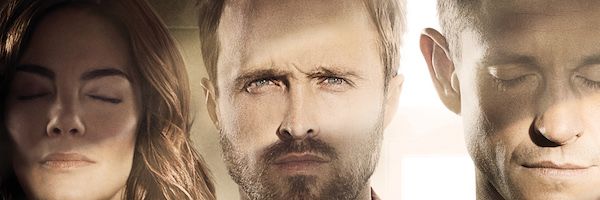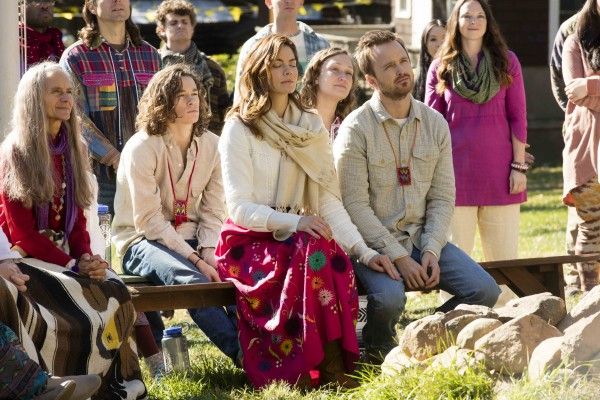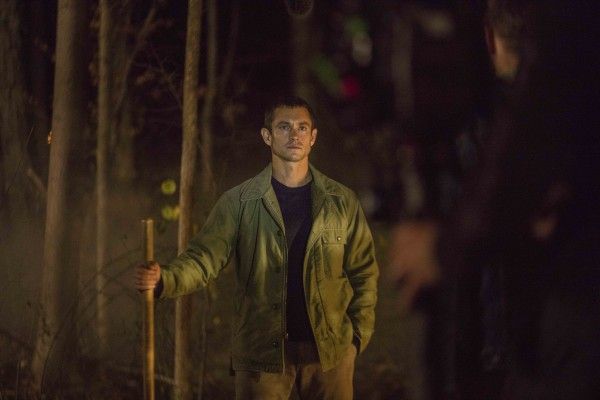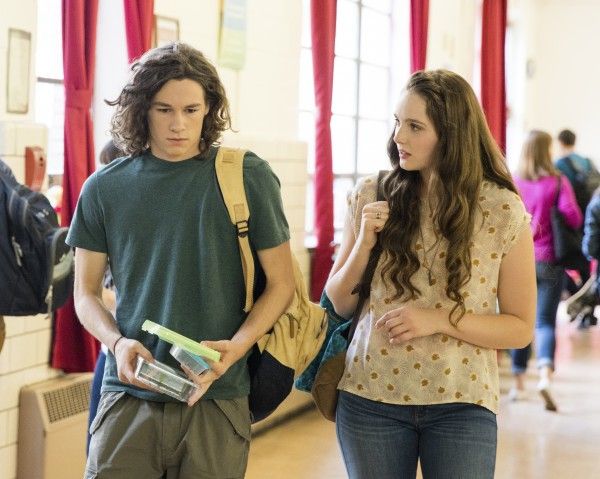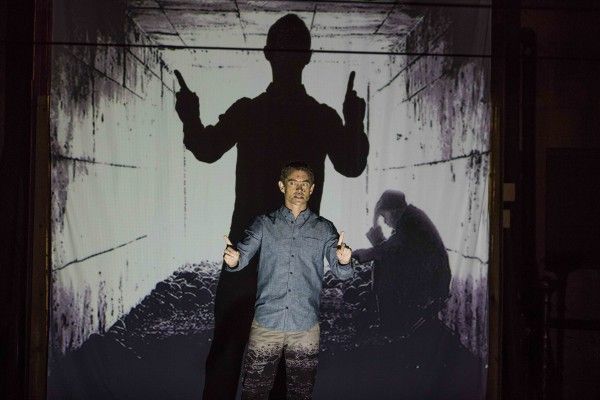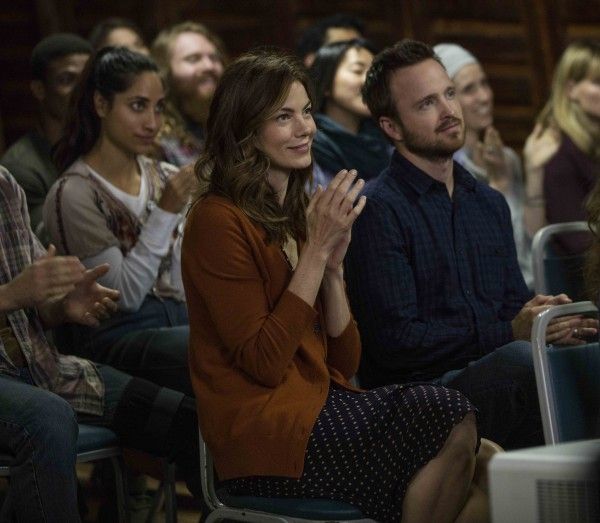The Hulu original series The Path follows a family at the center of a controversial religious movement, known as Meyerism, as they struggle with relationships, faith and power. As Eddie (Aaron Paul) questions whether all of the answers can be found within the religion that his wife Sarah (Michelle Monaghan) is so dedicated to, she finds herself pulled deeper and deeper into Cal’s (Hugh Dancy) world and his views on the way that they should be led.
During this exclusive interview with Collider, executive producers Jessica Goldberg (who created the series) and Jason Katims (Parenthood, Friday Night Lights) talked about how they came to collaborate on The Path, the evolution of the story, putting such a tremendous cast together, where they drew inspiration from, for this new religion, and the greater plan for their storytelling.
Collider: How did the two of you come to be making this show together?
JASON KATIMS: It came about because Jess wrote this script that came out of a really tough year she was going through, and she created this really beautiful thing that came out of it. I’m always compelled by something when it comes from a deeply personal place. There’s all this talk about the cult and about religion, but what really drew me to it was that it felt like there was an urgency to the story, and she needed to tell this story that was deeply personal to her. I think of it as less about a religion or cult than it is about faith, belief, marriage, family, and all of these things that drive us every day and that are the things we’re trying to figure out.
JESSICA GOLDBERG: I had a horrible year, where my dad died very quickly of cancer, and then I broke up with my husband. And then, a year later, I was lucky enough to get hired on Parenthood. I had been writing movies in my spare time and I thought, “I’m just going to shut the door and write something. I don’t know what it is yet, but I need to write something.” When I finished, I gave it to my agent, and he was like, “This is interesting.” He said, “You should give it to Jason,” but I was really scared. I had only worked with him for about a year, and when you look up to someone, it’s very scary to give them your original work. If they don’t like it, it’s going to be embarrassing.
KATIMS: But, I was a huge fan of Jess’. She wrote some of the most amazing stuff, in the time that she was on Parenthood, that was some of the best episodes we’d done on the show. She actually wrote a screenplay that I read, that I loved so much that I flirted with trying to direct it. I really admired Jess’ ability to write stuff where the characters come through in such a deep and real way. So, when I read this script, I knew we had to figure out a place that was going to do this, and we were really lucky with Hulu.
After you two started working together on the show, did that first script evolve or change much?
GOLDBERG: Once I gave it to Jason, we did some work on it. It improved, but the way it improved was by making what it was better, which is rare in the development process. It became the best version of itself. Sometimes in the development process, things can get watered down, or it can be about making everyone more likeable. It just was about elevating everything that was already there. The most interesting change is that when I first wrote it, there wasn’t the Hawk character, but now the oldest son is so deeply important to the show. [Sarah and Eddie] just had the little daughter, and [Hulu] said, “Where’s the Friday Night Lights family?”
KATIMS: If you’re going to get a note from your platform or network, hearing that they want to feel more stuff is great. It’s a great partnership with Hulu because their notes were about wanting to help us make what we all felt was the best version of the show, as opposed to pushing it into a place where you sometimes feel like you’re at odds with the people who are putting the show out there. This hasn’t felt that way, at all.
How did you put this cast together? Were these specific actors the ones you had in mind for these roles?
GOLDBERG: We had all of them in mind, except for Hugh [Dancy] because he was on a show. Michelle [Monaghan] and Aaron [Paul] were two people we had in mind as fantasy people. Cal was the character we struggled with the most. We didn’t know who that would be. You don’t want him to seem bad. You don’t want to have an actor that naturally played him like a bad guy, and you didn’t want someone too smarmy and charismatic. You want the charisma, but you want the complexity. But then, [Hannibal] got cancelled. I feel like it was lucky, not for that show, but for us.
KATIMS: Obviously, it’s unbelievable to have a cast with all three of those actors. Any one of them would be an amazing get, and getting all three of them is incredible, which speaks to the great script. Also, what’s amazing about this cast is everybody in the supporting cast. It’s really a tremendous ensemble. So, even though you have those three characters at the center of the show, who are the three central characters, the supporting cast is so crucial to the show and they are all amazing.
All of these characters seem to be keeping secrets from each other. Will there be a resolution to all of the questions this season, or will we still have unanswered questions?
GOLDBERG: The central questions of the first season are about Cal bringing the religion into the second generation. How that’s going to happen will be answered. And there’s Eddie’s crisis of faith and this question of whether you can be in the faith and not believe. That also gets answered. So, we answer a bunch of questions, and then open new ones and leave some unresolved. Those two are, to me, the main questions for Season 1, and I think we answer both of those.
When you run something like this, you want it to grow and expand, but the more people you bring in, the more attention it places on you, which causes its own set of problems. Will that continue to be an issue for this movement?
GOLDBERG: Yes. The thing that’s so interesting about new religions is that most of them don’t make it into a second generation. Most new religions die, but if you can make it past the second generation, it seems that you can keep going.
KATIMS: When we brought the script to Hulu, the other thing that they said was to pull back on how far the religion has come. In the original draft, they swooped in on helicopters and pulled people away from the tornado, and Hulu said, “Well, maybe they don’t have helicopters yet.” That was really a great note because it’s allowing us to watch that happen, over time.
GOLDBERG: The place religion has taken in American life is that where society has failed us, religion can step in and be that community. It provides a lot of stuff that we’re missing. That’s why it’s effective sometimes.
Did you take inspiration from anything in particular, or did you want to create your own religious movement?
GOLDBERG: Creating your own religion is terrifying and really fun. I took inspiration from a lot of different places. One of my friends, crazily at 40, decided to become a Jesuit priest, and that really impacted me. The Jesuit mission is so beautiful, and they’ll spend three months in the world with no money to understand what it’s like to live life like that, in order to be able to help people. We actually used that a little bit when, in Episode 8, Eddie goes on this walk with $30 and he has to walk for 500 miles. We also took from a lot of Eastern religion, and from our own modern idealism. If we could grow our own food and have sustainable resources, what would it be like to live that way? It always seems to go bad, but the fantasy of it is fun to play with.
What sort of greater plan do you have for this show? How far down the road have you thought about the story you want to tell?
GOLDBERG: I think about that a lot. I can’t really tell you anything that would happen, but I think about it.
KATIMS: You always want to strike that balance between having your eye toward things that you see happening in the future for these characters against being open by seeing what’s there when the cuts come back. You’ll see things that surprise you. Characters that you thought you would never see again are suddenly intriguing. That’s the beauty of television. You get to have ideas about where you want to go, but also be somewhat improvisational. That’s what’s exciting about doing a TV show. It’s a living organism. As a storyteller, you get to respond to not only what was in your head to begin with, but also what’s inspiring you in, as a result of what you’re seeing.
The Path airs on Hulu.

